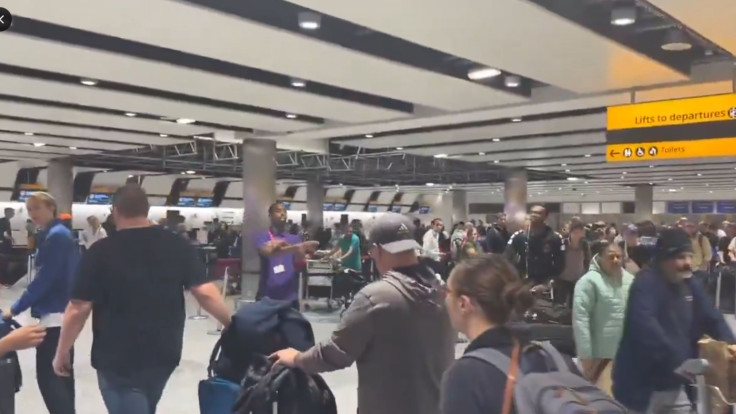The Software Behind Europe's Check-In Chaos — What Is Muse, and Why It Matters?
Passengers face hours-long queues as Collins Aerospace's Muse system outage paralyses check-in and boarding across Europe.

The cyberattack that crippled check-in systems at Heathrow, Brussels and Berlin on Friday night, 19 September, has cast an unflattering spotlight on a piece of software most passengers have never heard of.
The disruption was traced to Muse, a passenger processing system developed by Collins Aerospace, a subsidiary of US defence and aviation giant RTX.
Muse sits at the heart of how modern airports function. It powers electronic check-in, baggage tagging and boarding pass validation, allowing airlines to share desks and gates instead of maintaining separate counters.
This shared-use approach has been hailed as a cost saver and efficiency booster — but as the chaos showed, it also creates a dangerous single point of failure.
How Muse Works
Traditionally, each airline managed its own dedicated check-in area, complete with branded kiosks and staff. That model proved inflexible and expensive, especially at airports hosting dozens of carriers.
Muse, launched as a flexible 'common use' platform, allows airlines to tap into the same hardware and back-end systems, switching desks dynamically depending on demand.
The system integrates passenger records, baggage details and security requirements into one digital framework.
At a major hub such as Heathrow, this means that when a flight to New York is fully booked, airlines can quickly allocate more desks, while low-traffic flights use fewer resources. The result is faster throughput and more efficient use of space.
Why Airports Depend on It
For airports, shared systems like Muse deliver tangible benefits. They reduce costs by pooling technology infrastructure, cut down on physical space requirements, and make staff deployment more flexible. They also streamline coordination with government security agencies, which rely on consistent data formats to screen passengers.
Over time, Muse has become deeply embedded in the daily operations of dozens of airports worldwide. That level of integration has turned Collins Aerospace into a critical supplier not only to airlines but also to national aviation authorities.
The Risks of Efficiency
Yet the events of Friday evening highlighted the flip side of efficiency. When Muse was knocked offline by a cyberattack, airlines across three countries simultaneously lost the ability to process passengers electronically.
Staff resorted to hand-written baggage tags and phone-based boarding lists, recreating an era of travel long thought obsolete.
The incident is not without precedent. Last year's global IT crash caused by a faulty CrowdStrike update grounded flights across the US, exposing how fragile aviation IT systems can be when reliant on a few major providers.
Collins Aerospace and RTX
Collins Aerospace, headquartered in North Carolina, is part of RTX (formerly Raytheon Technologies), one of the world's largest aerospace and defence companies.
RTX reported revenues of more than $67 billion in 2024, with Collins accounting for a significant share through its commercial aviation and airport systems divisions.
While the company emphasises reliability and innovation, cybersecurity is now under sharper scrutiny.
RTX confirmed last week that the Muse outage was due to a 'cyber-related disruption' and said it was working with investigators to harden defences.
Rethinking Aviation Security
As Europe's airports recover from the immediate fallout, regulators and industry leaders face hard questions. Should airports diversify their IT suppliers to reduce dependence on one platform? Should cybersecurity standards for aviation software be strengthened to the same level as air traffic control systems?
For travellers, the incident offered a glimpse behind the digital curtain of modern aviation. The check-in counter that seems routine is in fact part of a vast, interconnected system. When that system fails, the ripple effects can stretch from Heathrow to Berlin in a matter of minutes.
That concern was echoed online, where one commenter wrote: 'Once again we see the fragility of the digital world. It's great when it works. Move to digital only and we are a more attractive target for hostile actors. But Ryanair is banning paper boarding passes, landlines now delivered by broadband, businesses going cashless. Mad.'
© Copyright IBTimes 2025. All rights reserved.






















